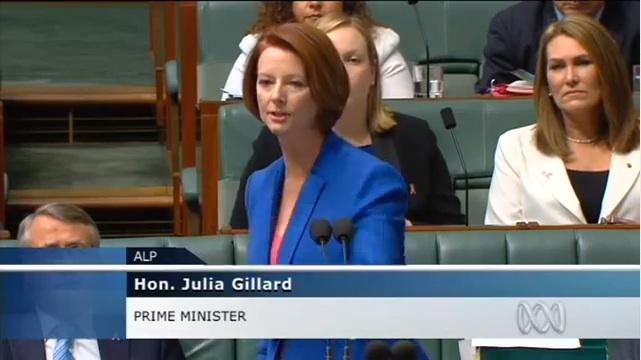SUMMARY
This is AI generated summarization, which may have errors. For context, always refer to the full article.

SYDNEY, Australia – Prime Minister Julia Gillard Wednesday, October 10, defended calling Australia’s opposition leader a misogynist in a speech which sparked global attention and a divisive reaction about the role of sexism in politics.
Gillard, the nation’s first woman leader, lashed out Tuesday, October 9, at Tony Abbott after he called for the removal of parliamentary speaker Peter Slipper over lurid text messages which referenced female genitalia.
Slipper, who stood aside in April amid claims of gay sex harassment, survived an opposition motion to dump him with the support of Gillard and her ruling Labor party, but later resigned.
During the debate, a fired-up Gillard accused Abbott of hypocrisy, saying she had been offended by many of his remarks over the years and she would not be “lectured about sexism and misogyny by this man”.
Her tough comments went viral and won international praise, with US feminist blog Jezebel admiringly describing her as a “badass”.
“I made my speech in parliament yesterday because I formed the view that enough is enough,” Gillard said Wednesday.
“I’ve had enough, Australian women have had enough. When I see sexism and misogyny I’m going to call them for what they are.”
(Watch speech below)
But her decision to defend Slipper, who she was instrumental in appointing to bolster Labor’s voting numbers, while at the same time hitting out at Abbott, was slammed in Australia.
Deputy opposition leader Julie Bishop accused Gillard of using sexism as a weapon against criticism and said women deserved better.
“The prime minister is setting back the cause of women decades by using sexism as a shield against criticisms of her performance,” she said.
“Instead of being remembered as Australia’s first female prime minister, she’ll be remembered as the prime minister who let down the women of Australia when she was put to the test.”
Abbott also weighed in, saying it was time “everyone in this parliament moved on from the gender card which so many members of the government have been playing”.
The media was also critical, with The Sydney Morning Herald saying Gillard faced the stark choice of defending her parliamentary numbers, or defending the principle of respect for women.
“She chose to defend her numbers,” said the newspaper’s political editor Peter Hartcher.
“She chose power over principles. It was the wrong choice. The prime minister gained nothing and lost a great deal.”
But elsewhere, her scathing words were praised.
American news portal The Daily Beast said “Margaret Thatcher must be smiling,” referring to the former British leader, known as the Iron Lady, while the New Yorker said Barack Obama could learn debating tips from Gillard.
Gillard’s colleagues also defended her reaction to Abbott’s “outrageous personal abuse”.
“He calls her names across the table, repeatedly,” Families Minister Jenny Macklin said, while Health Minister Tanya Plibersek said there was a key difference between Abbott and Slipper.
“The difference between Peter Slipper and Tony Abbott is Peter Slipper takes responsibility, he puts his hand up, he apologizes, he acknowledges it’s wrong, and he resigns,” she said.
Slipper’s demise was a blow to Gillard, who last year engineered his promotion to speaker after he defected from Abbott’s Liberal Party.
That move lost the opposition one vote and shored up Labor’s wafer-thin hold on power.
Following his departure and the promotion of Anna Burke to speaker, Labor now has 70 MPs on the floor to the coalition’s 72. There are seven crossbenchers, with Labor needing the support of five to win any votes. – Martin Parry, Agence France-Presse
Add a comment
How does this make you feel?
There are no comments yet. Add your comment to start the conversation.